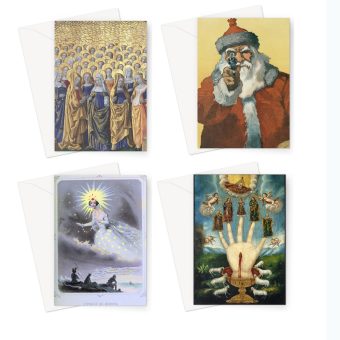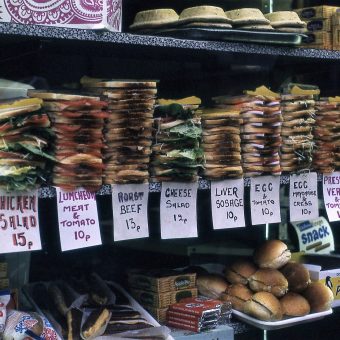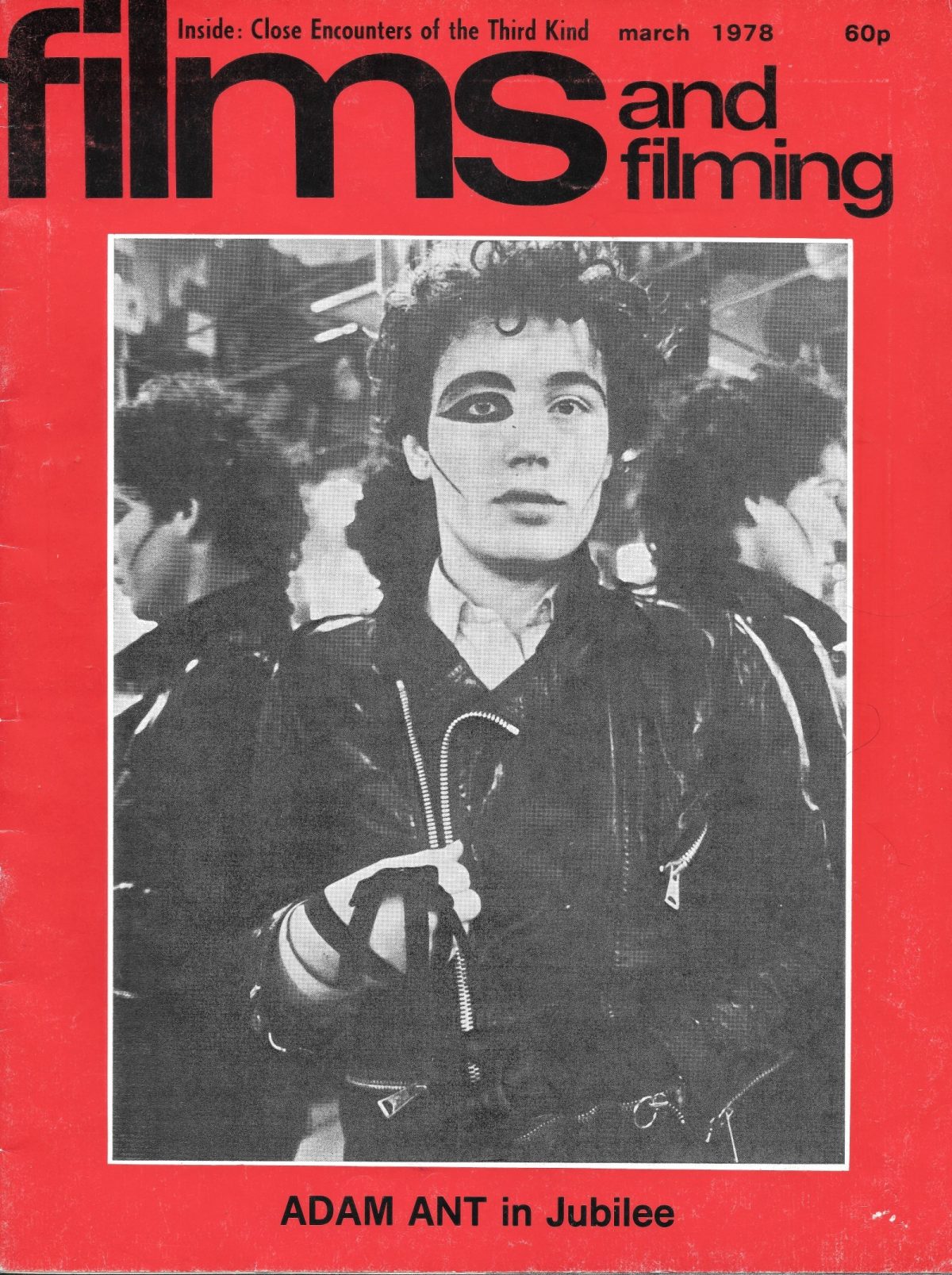
I was first introduced to Derek Jarman through a porn mag. It was one of the few my older brother hid in a Subbuteo box in the front bedroom cupboard. I was more interested in film directors, literature, poetry, and an early death than playing football games on a green felt carpet. The giveaway to my brother’s secret stash was the fact his Subbuteo box was regularly Sellotaped for no apparent reason. It suggested to my Holmesian mind my brother was hiding something. He was. Porn. Top quality porn. His taste in porn mags was interesting. Cinema X, Cinema Blue, a few copies of Game (with the delectable Bethany from Romney Marsh), and one Mary Millington’s Whitehouse, which was more like a book on gynaecology.
It was in one of the issues of Cinema Blue that I first read about Derek Jarman and his ‘gay sex porno’ Sebastiane (1976). The reviewer rated it an intelligent and beautiful movie, but not a sex flick. Interestingly, Jarman’s father thought the film a good depiction of life in the RAF during World War Two. Go figure.
I was intrigued by Sebastiane because it had some of the cast of The Rocky Horror Picture Show (which was a favourite) and starred artists like Lindsay Kemp and Duggie Fields. My mother thought Kemp a genius, and knew of his work from his time in Edinburgh (where we lived) performing The Maids. It may surprise the Guardian and its narrow-minded middle class readers but working class gammons love culture just as much, if not more, than they do.
There was never really anything to wank over in Cinema Blue. Unless you counted the B&W ads for home movies of cock-sucking nuns or daisy chain queers fucking each other around a swimming pool in L.A. I always preferred the articles and that, dear reader, is how I first read about Jarman.
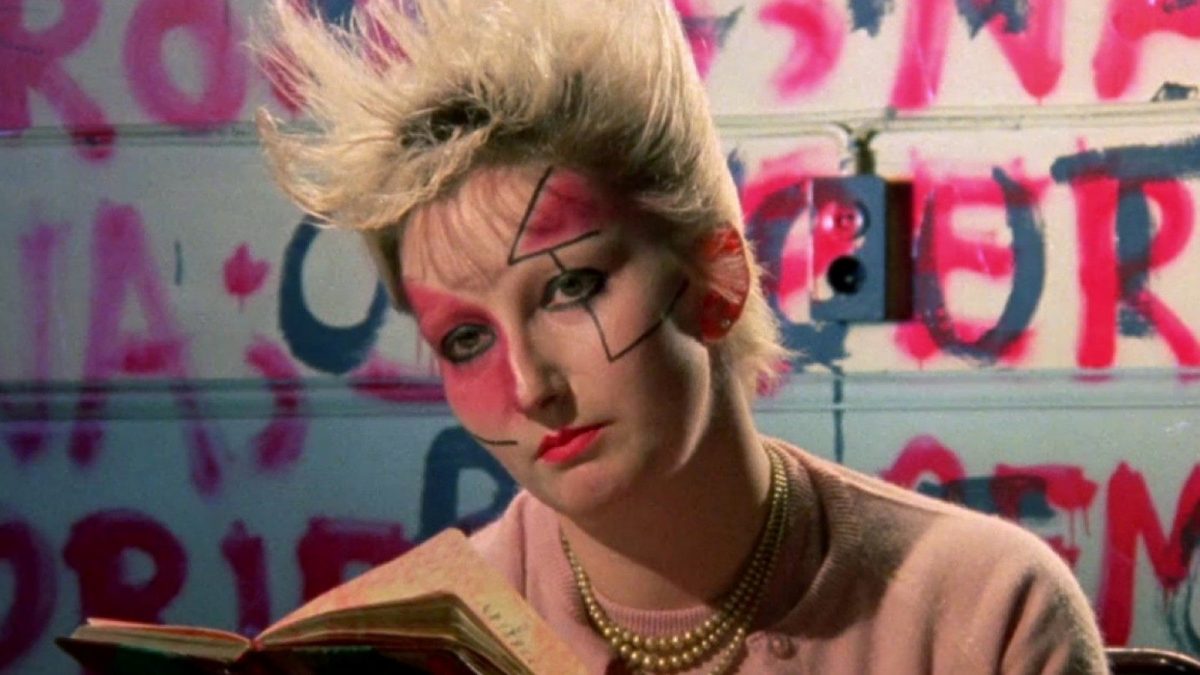
I was swithering about sex. It’s called growing up. I was fourteen. I was a pupil at an all boys Christian Brothers’ school. I read Oscar Wilde and Quentin Crisp, Franz Kafka, Derek Marlowe, Dostoyevsky, Albert Camus and Alistair MacLean. I loved the poetry of W. H. Auden and Robert Graves, and thought Goodbye To All That, the best autobiography I’d read. My favourite artists were Francis Bacon, David Hockney, Peter Blake, Jackson Pollock, Picasso, Dali, Matisse and Courbet. My favourite directors were John Boorman, who I found though Zardoz and Ken Russell, who I found through my mother’s enthusiasm for Song of Summer and later when I spent one Christmas (was it 1973?) sitting at the top of the stairs in our old two-up-two-down listening to the dialogue for Women in Love when it was first screened on BBC One. I half-fancied a classmate called X. who I thought prick-teased and wrote “Donny [Osmond] is Love” on my pencil case. But I fell in love with too many older girls from the local convent school, who all seemed to knowingly press themselves against my erection on the dance floor at school discos during those slow numbers when the nuns and the brothers kept the overhead lights on – just in case…. I wrote these dear pre-Raphaelite beauties love poems. I was under the pull of their gravity, but they were far greater planets who orbited other sons.
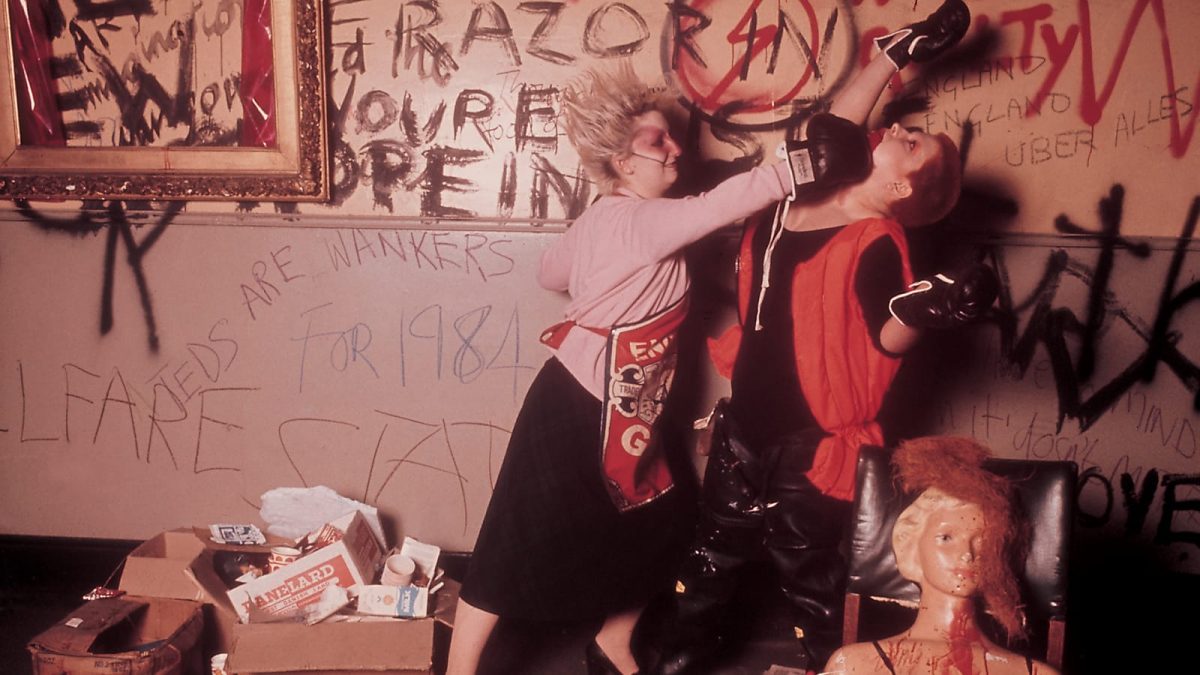
I drifted. Which is probably the best description of my life to date. I dreamed of marrying at sixteen and having a large family by 25. Living in a council house, and holding down some factory job. But literature and films will turn your head to what may be and I followed that question towards its unreachable answer.
The next I read of Jarman was in the NME (I think), he was making a punk movie called Jubilee which was reviled by the Daily Mail, Mr. Angry of Slough (see Kenny Everett), Vivienne Westwood, and punks of every order. Such faux outrage made me want to see this film all the more. It was an ‘X’ certificate and I was too young. Though I would have certainly blagged my way in if ever it had come to our local fleapit. It didn’t. Instead, I followed the film’s course through clipping articles out of newspapers and magazines, then buying a cassette of the soundtrack. Boys at school said, ‘What the fuck is that shit? That’s not punk…’ as they heard Jordan singing Rule Britannia. I did not care. A soundtrack album or cassette (like the ones I bought for Ken Russell’s The Music Lovers or Lisztomania) brought me closer to genius.
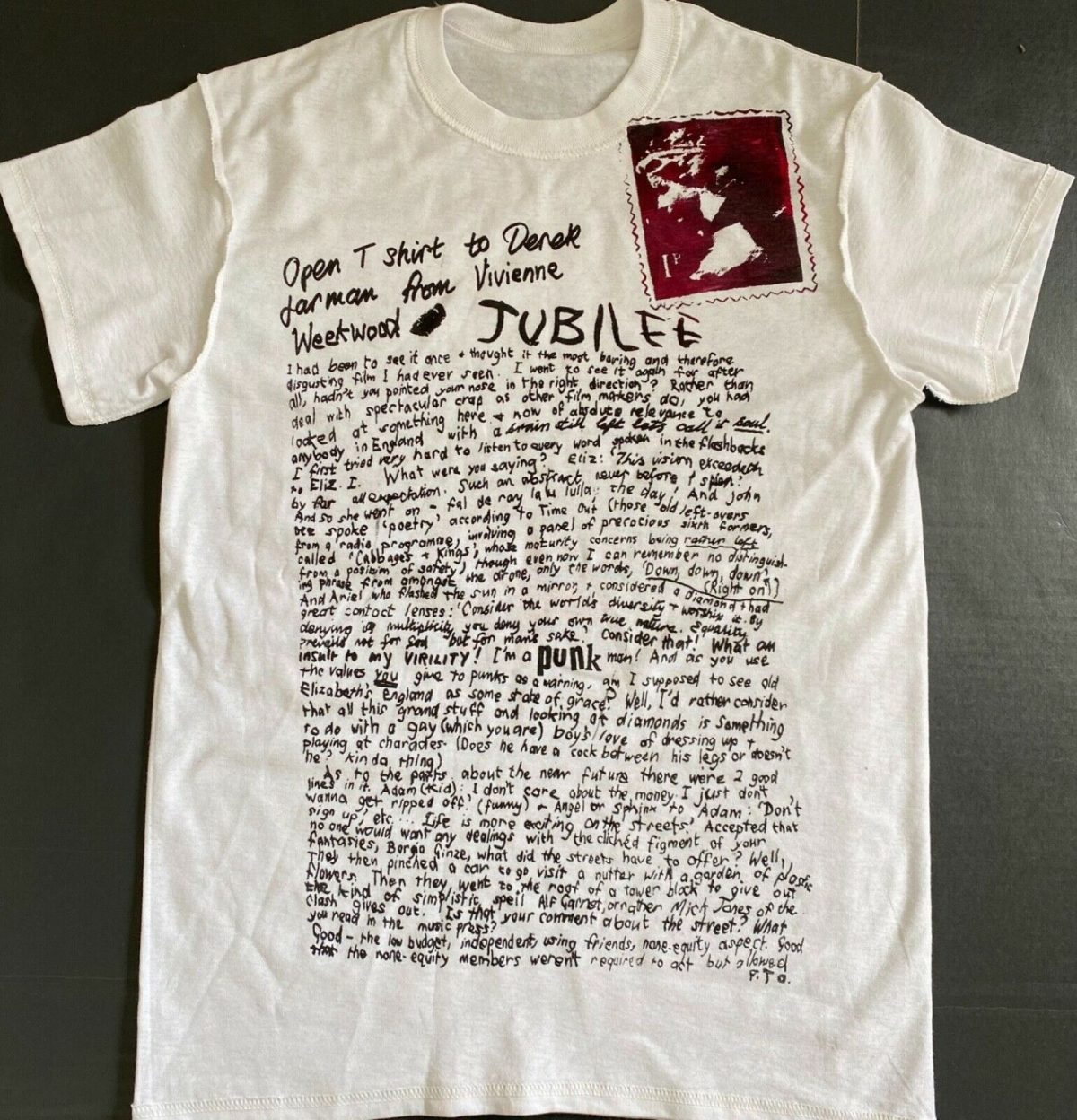
Open T shirt to Derek Jarman from Vivienne Westwood
Jubilee
I had been to see it once and thought it the most boring and therefore disgusting film I had ever seen. I went to see it again for afterall, hadn’t you pointed your nose in the right direction? Rather than I deal with spectacular crap as other film makers do, you had looked at something here & now of absolute relevance to anybody in England with a brain still left let’s call it soul. I first tried very hard to listen to every word spoken in the flashbacks to Eliz. I. What were you saying? Eliz: ‘This vision exceedeth by far all expectation. Such an abstract never before I spied.’ And so she went on – fal de ray la lu lullay the day! And John Dee spoke ‘poetry’ according to Time Out (those old left overs from a radio programme, involving a panel of precocious Sixth formers, called “Cabbages & Kings”, whose maturity concerns being rather left from a position of safety) though even now I can remember no distinguishing phrase from amongst the drone, only the words,‘Down down down’ (Right on)! And Ariel who flashed the sun in a mirror, & considered a diamond & had great contact lenses: ‘Consider the world’s diversity & worship it. By denying its multiplicity you deny your own true nature. Equality prevails not for god but for man’s sake.’ Consider that! What an insult to my VIRILITY! I am punk man! And as you use the valves you give to punks as a warning, am I supposed to see old Elizabeth’s england as some state of grace? Well, I’d rather consider that all this grand stuff and looking at diamonds is something to do with a gay (which you are) boy’s love of dressing up & playing at charades. (Does he have a cock between his legs or doesn’t he? Kinda thing)
As to the parts about the near future there were 2 good lines in it. Adam (kid): I don’t care about the money I just don’t wanna get ripped off.’ (Funny) & Angel or Sphinx to Adam: ‘Don’t sign up’, etc…Life is more exciting on the streets.’ Accepted that no one would want any dealings with clichéd figment of your fantasies, Borgia Ginze, what did the streets have to offer? Well, they then pinched a car to go visit a nutter with a garden of plastic flowers. They then went to the roof of a tower block to give out the kind of simplistic speil Alf Garnet, or rather Mick Jones of the clash gives out. Is that your comment about the street? What Good – the low budget, independent, using friends, none-equity aspect. Good that the none-equity members weren’t required to act but allowed
P.T.O.
‘to say their lines as if reading from a little book inside their head, because what happened by result of this acting, as against none acting ability was that the performances depended for strength upon how much humanity the people behind the role posessed. Thus Jordan & Helen were good whereas Jenny Runacre’s mediocrity of spirit bludgeoned through. Albeit – these aspects of your approach & style were anarchical, I am not interested in however interestingly you say nothing. [The Rule Britania Eurovision Song Contest was good because you said something – nationalism is vile & Eliz II is a commercial con trick]. Just like E.I.
An anarchist must say, ‘Trust yourself’. It’s the place to start. But self-indulgence is not the answer. You have to be brave & you are only a little. You have to cut the crap & not the cheese & chuck out – UGH – for instance, those Christian crucifixion fixations (sex is not frightening, honest) – “the pervasive reek of perverse & esoteric artinesss, the delight in degradation & decay simply for its beauties when stylized. An irresponsible movie. Don’t remember punk this way” (all quoted from Chris Brazier in M. Maker)
But I ain’t insecure enough, nor enough of a voyeur to get off watching a gay boy jerk off through the titillation of his masochistic tremblings. You pointed your nose in the right direction then you wanked. It was even more boring than Uncle Tom Don Letts’ even lower budget film.
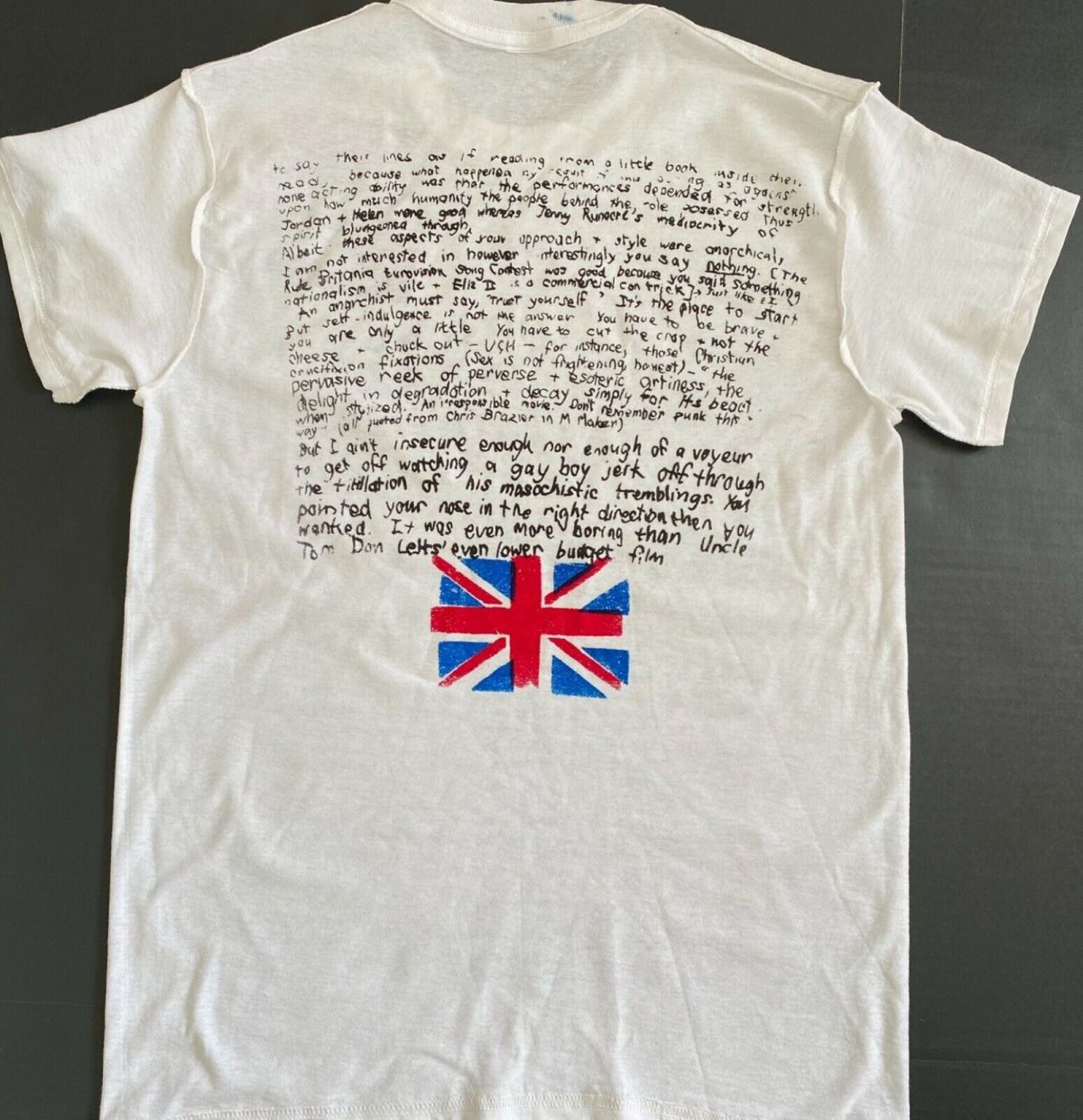
Derek Jarman (1942-1994) was a filmmaker, artist, diarist, writer, set designer, activist, and gardener. He was born and raised in the London suburb of Northwood. He attended Canford School in Dorset before studying English at King’s College, London. He then studied painting at the Slade.
Jarman’s career as an artist led him into set designing for the stage and then as set designer for Ken Russell working on The Devils (1971) and Savage Messiah (1972). Jarman and Russell would later collaborate on operas in the 1980s. During this time, Jarman began producing and directing short Super-8 movies which he screened to friends in his studio at Butler’s Wharf, London.
In 1976, he directed his first full-length feature film Sebastiane about the martyred saint who was shot through with arrows. This film has been described as the “first positive depiction of homosexuality.” It caused controversy due to one actor’s erect penis during a love-making scene. The film was in Latin and starred musician Barney James, Richard Warwick, one of three Crusaders in Lindsay Anderson’s If…, and had cameos from Lindsay Kemp, the artists Duggie Fields and Andrew Logan, and three of the cast from The Rocky Horror Picture Show, Little Nell, Patricia Quinn, and Peter Hinwood.
The following year, Jarman started filming Jubilee a film inspired by seeing Jordan coming-off a train in Victoria Station dressed in white PVC boots and punk clothes and startling geometric make-up. The idea of a punk movie brought in some backers who thought they could make a quick buck out of punk rock. Jarman opened the film up to include some ideas from a script he had written about the Elizabethan magus Doctor John Dee. The script was hardly finished before the filming commenced.
I think it was about two-or-three years later I eventually saw Jarman’s movie circa 1980-81. I liked it. Thought it fun. Thought it a fair depiction of the United Kingdom in the middle to late 1970s. I also thought it flawed. It was a series of sketches anchored around the set-up of John Dee (Richard O’Brien) giving Queen Elizabeth I (Jenny Runacre) a glimpse of a future Britain where anarchy, war, poverty, mass unemployment, and unbridled capitalism rule. It wasn’t really the future but a veiled autobiography exploring Jarman’s own frustrations and fears of what was happening to his “green and pleasant land.”
Jarman, as he told the NME circa 1980, was “a conservative, with a small ‘c’.” Like G. K. Chesterton, he longed for an imaginary past where everything was fair, and equal, nicely presented and clean. Yet, Jarman, unlike Chesterton, was able to poke fun at this fantasy of the past by having a character in his film painting artificial flowers in his artificial garden, and killing the life-giving bugs with bug spray.
Jarman described Jubliee as:
..a fantasy documentary fabricated so that documentary and fictional forms are confused and coalesce.
Queen Elizabeth II is dead. She was mugged for her crown while out shopping down an old dark road in Deptford. We all live in “R.I.P. OFF” Britain where:
The instigators of punk are the same old petit bourgeois art students, who a few months ago were David Bowie and Bryan Ferry look-alikes – who’ve read a little art history and adopted some Dadaist typography and bad manners, and who are now in the business of reproducing a fake street credibility.
Jarman failed to see that punk was truly revolutionary. It liberated just as much as it anticipated Thatcherism with its D.I.Y. stance and belief in taking charge of one’s life. Was this not a definition of the Protestant work ethic that would be espoused by future Prime Minister Margaret Thatcher in the 1980s? But Jarman thought Thatcher a “revolutionary”–the cynical destroyer of all the things he believed best represented England.
This wasn’t Tory Britain but the UK under the mismanagement of Prime Minister “Sunny” Jim Callaghan and his Chancellor Denis Healey, who did not mind bankrupting the country–not once but twice–causing untold misery through poverty, three-day weeks, unemployment, high taxes, and ubiquitous strike action. The landscape of Jubilee is the nightmare of a socialist government failing to bring its promised rewards, as Jarman later explained:
We have now seen all established authority, all political systems, fail to provide any solution – they no longer ring true.
And, of course, it anticipated the cynical economics of Thatcherism, especially in the character of Borgia Ginz (played by the ‘legendary’ Great Orlando) who epitomised the very worst of the politicians and bankers who rule our world:
You wanna know my story babe. It’s easy. This is the generation that grew up and forgot to lead their lives. They were so busy watching my endless movie. It’s power babe, power. I don’t create it, I own it. I sucked and sucked and I sucked. The media became their only reality and I owned their world of flickering shadows. BBC. TUC. ITV. ABC. ATV. MGM. KGB. C of E. You name it, I bought them all and rearranged the alphabet. Without me, they don’t exist.
It was the quote that made me want to burn it all down. All politicians are the enemy. Just look at your government. As Ginz said after he bought and sold the world:
As long as the music’s loud enough, we won’t hear the world falling apart.
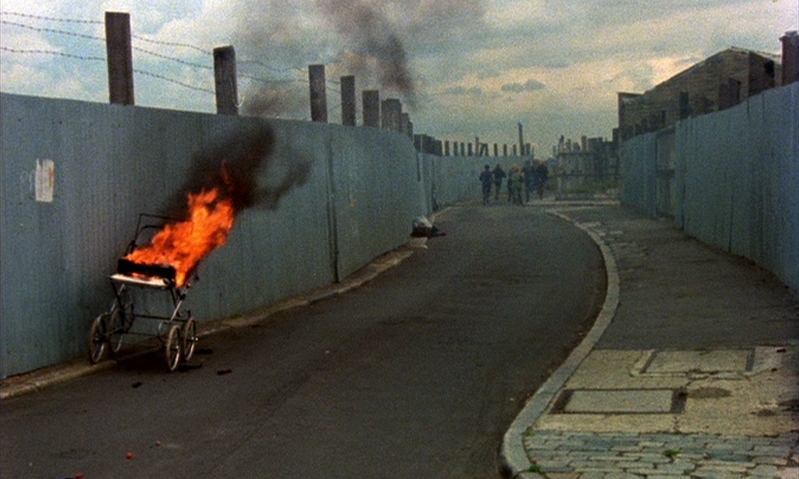
Jubilee‘s most controversial scene was the one in which Happy Days (Gene October) is murdered during sex by Crabs (Little Nell), Mad (Toyah), Bod (Jenny Runacre) and Amyl (Jordan). Happy Days is asphyxiated in pink plastic and dumped into the mud of the Thames while Angel (Ian Charleson) sings My Love is Like a Red, Red Rose. British Film Censors objected to the women killing a man, suggesting to Jarman he didn’t want his movie to inspire any Clockwork Orange copycat violence. Which is rather odd considering how many men are depicted in movies raping and killing women with little comment from censors.
The film opened in 1978 to poor reviews. It was loathed by punks and reviled by many who had taken part in it. Now, of course, these individuals see the film’s value. As Jarman later said:
Afterwards, the film turned prophetic. Dr Dee’s vision came true—the streets burned in Brixton and Toxteth, Adam [Ant] was on Top of the Pops and signed up with Margaret Thatcher to sing at the Falklands Ball. They all sign up in one way or another.
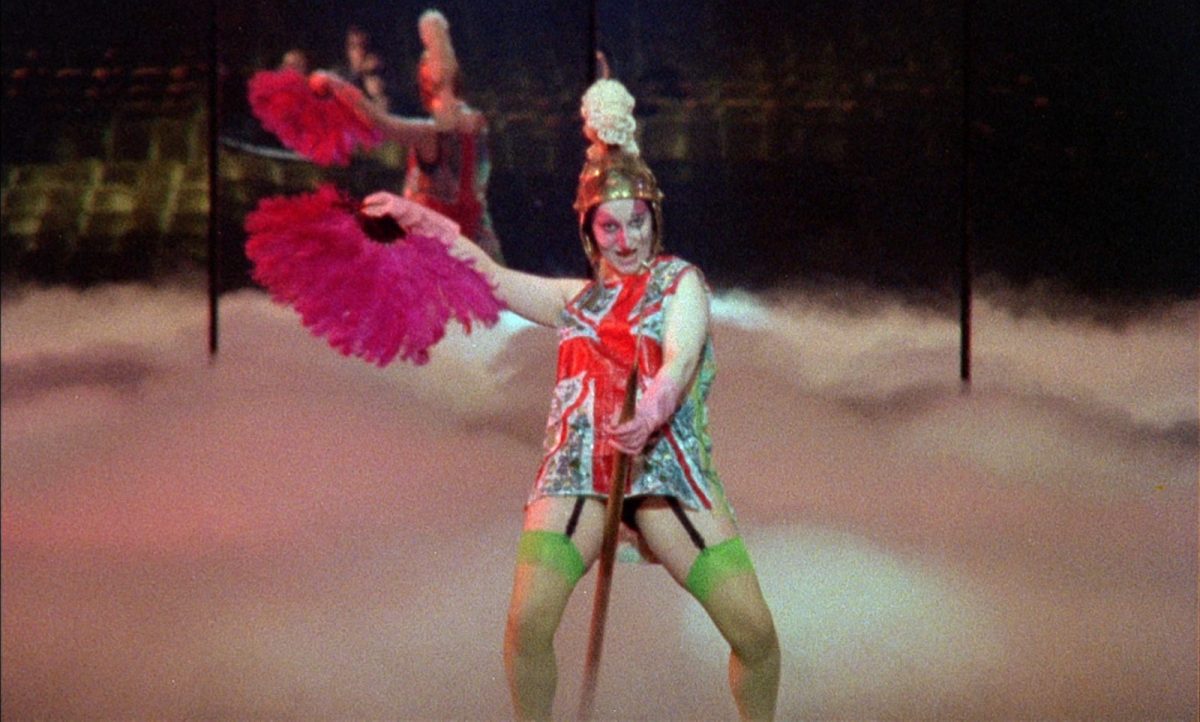
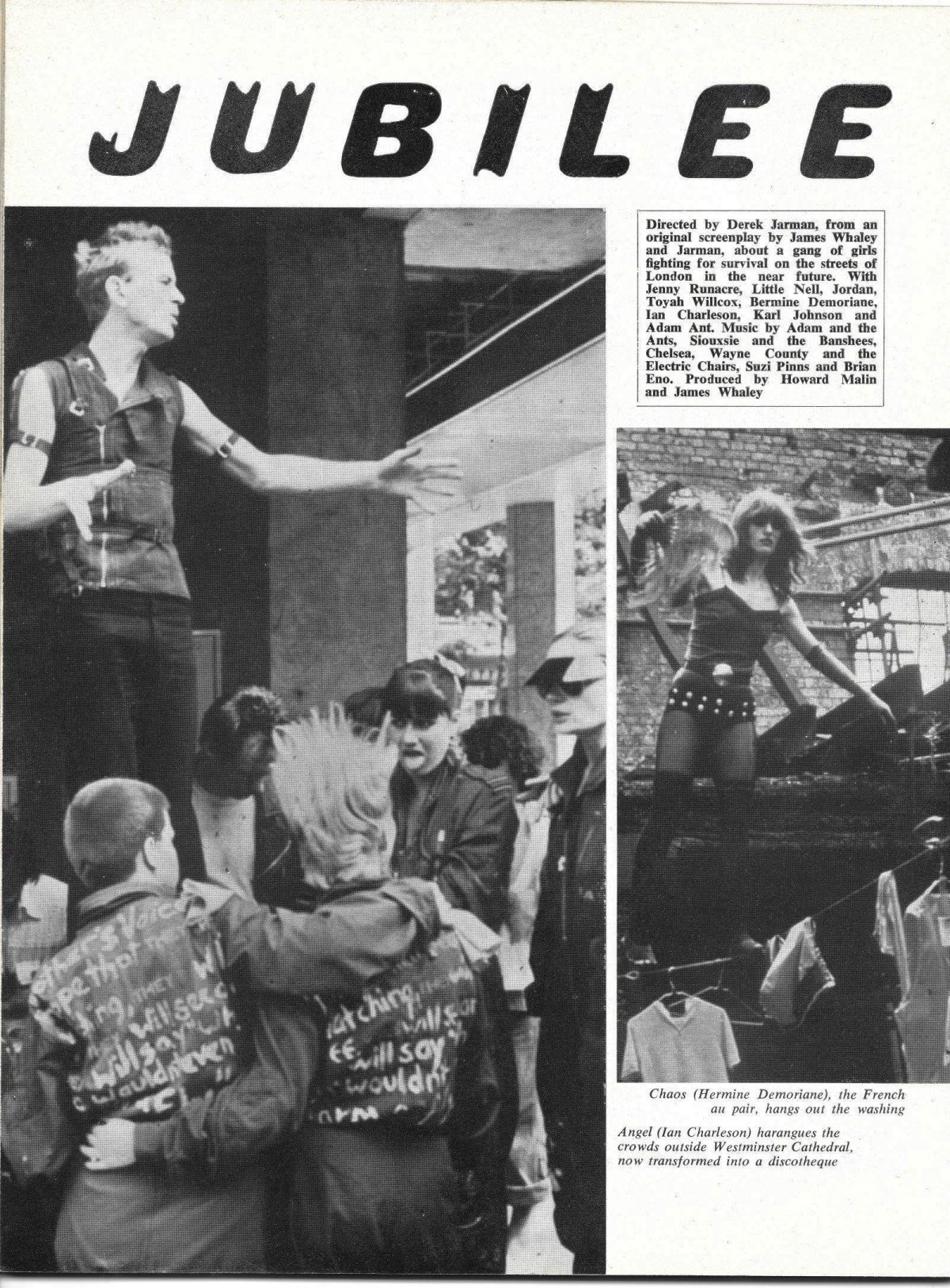
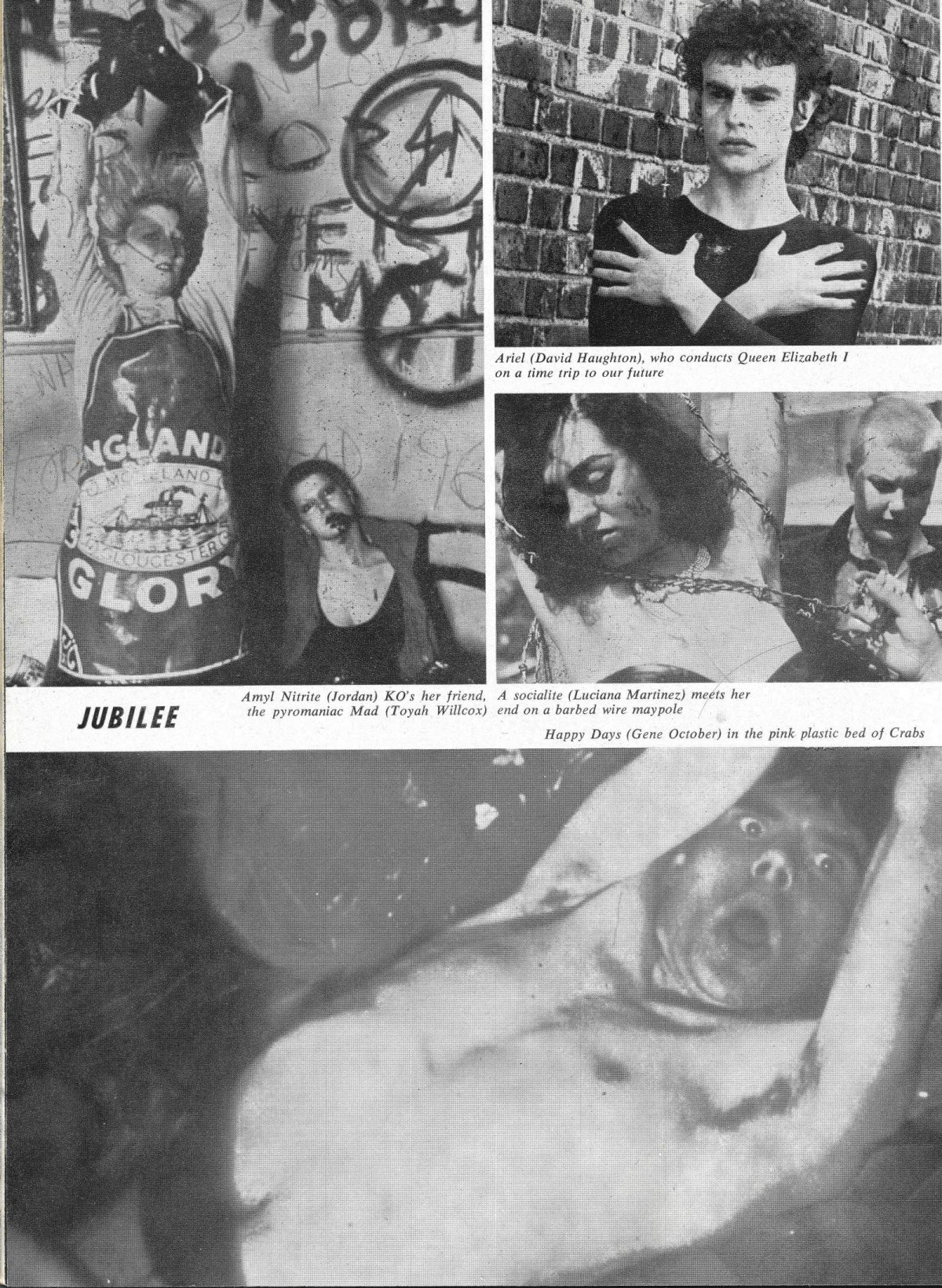
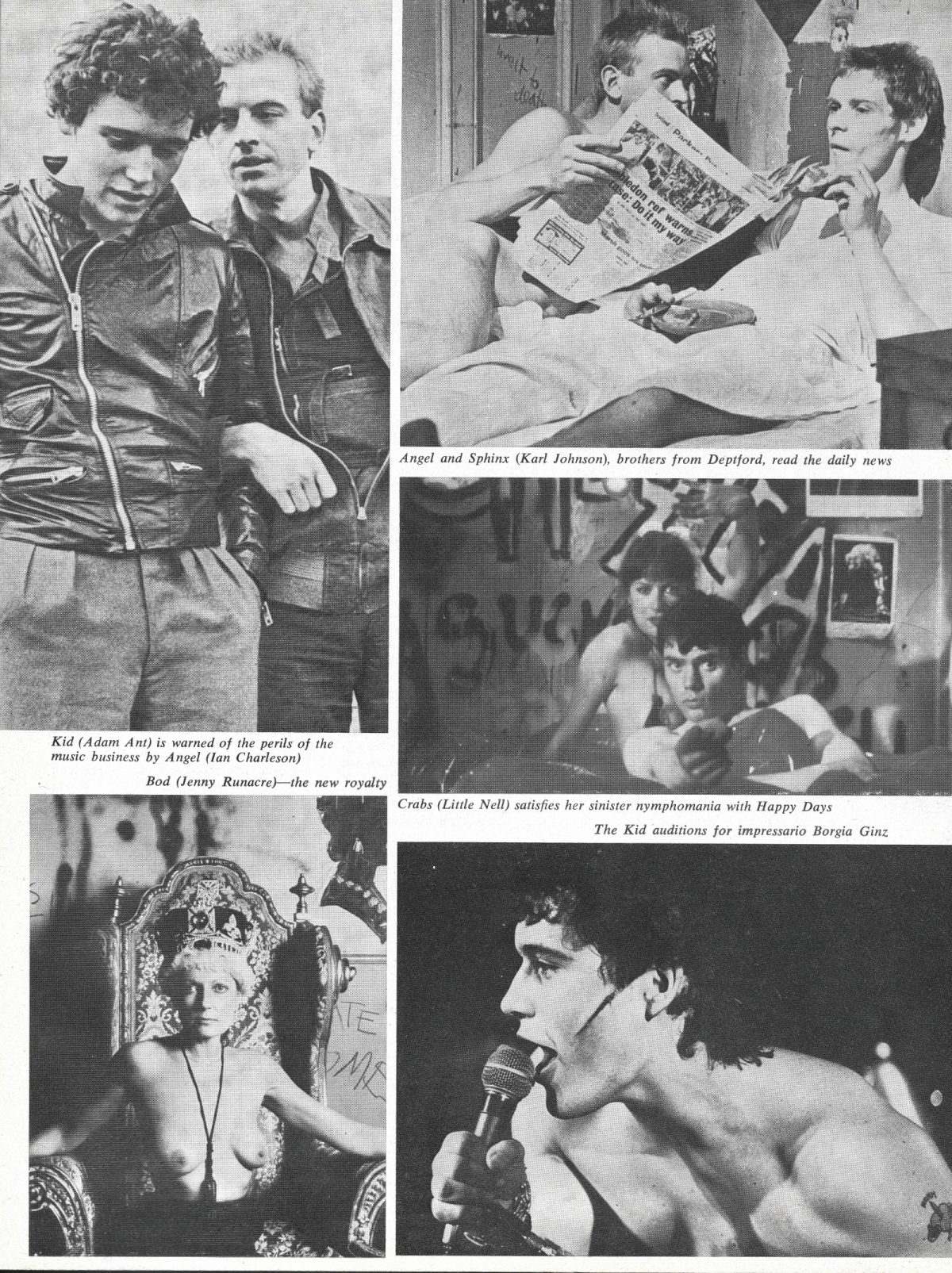
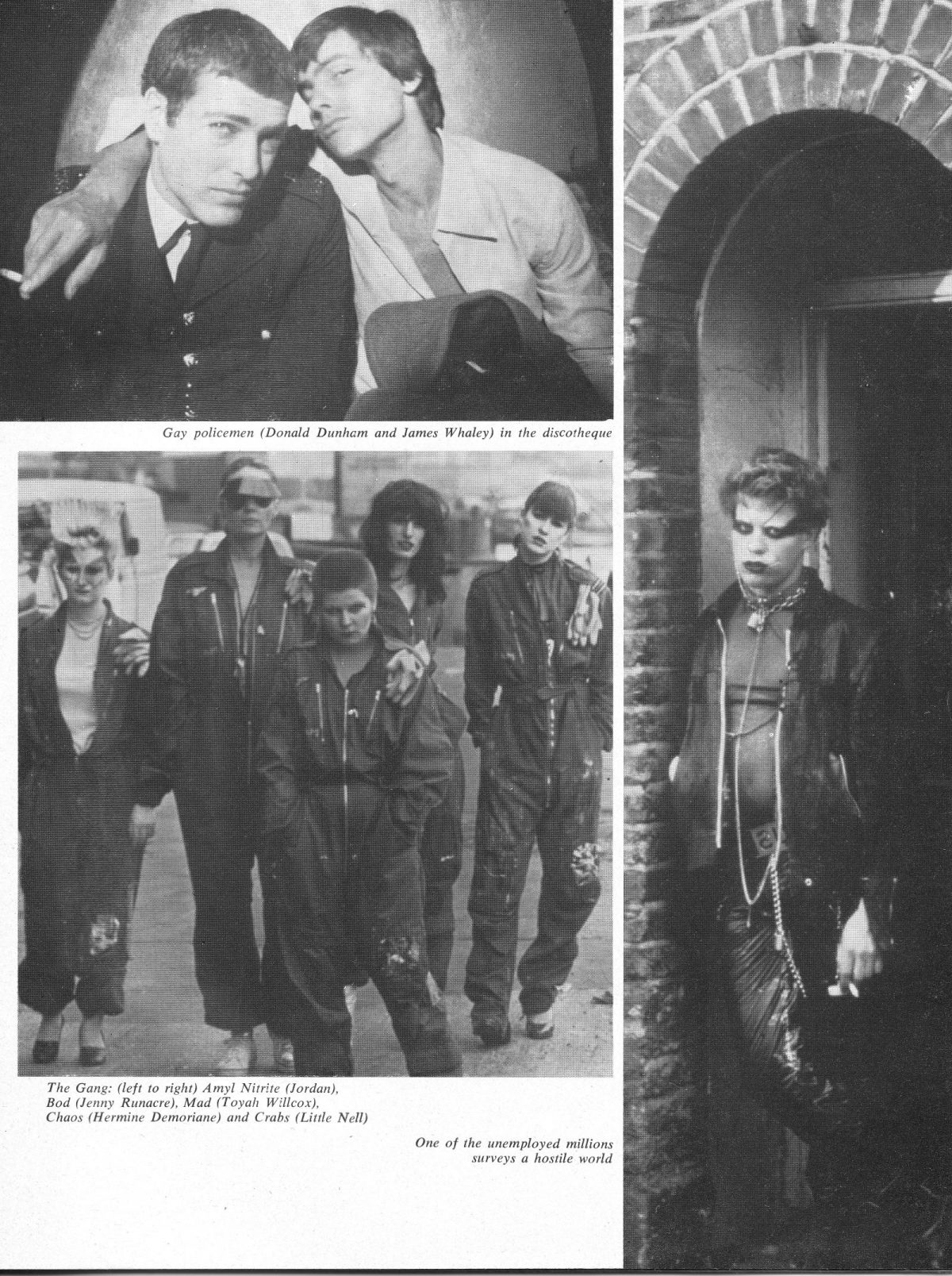
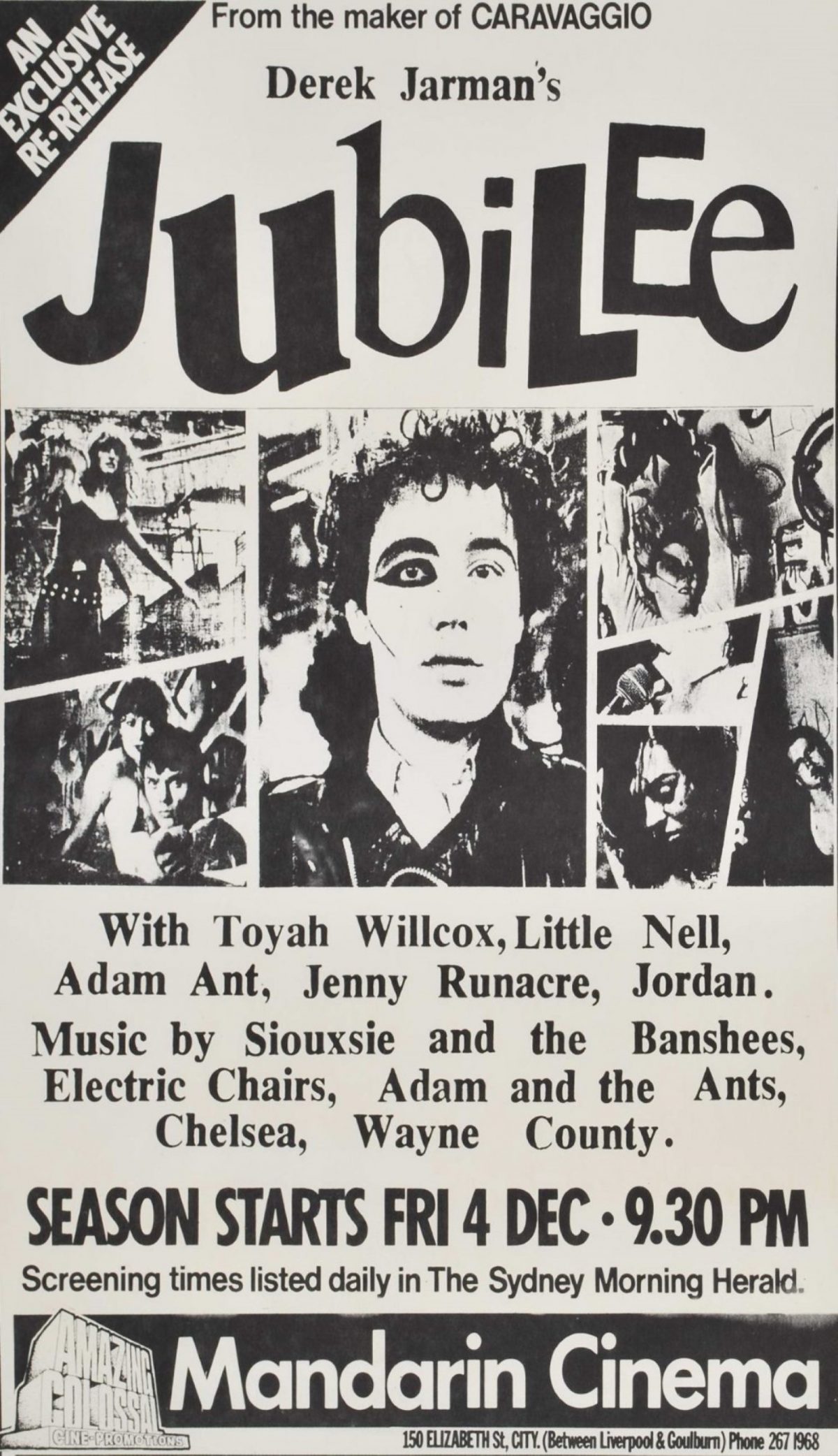
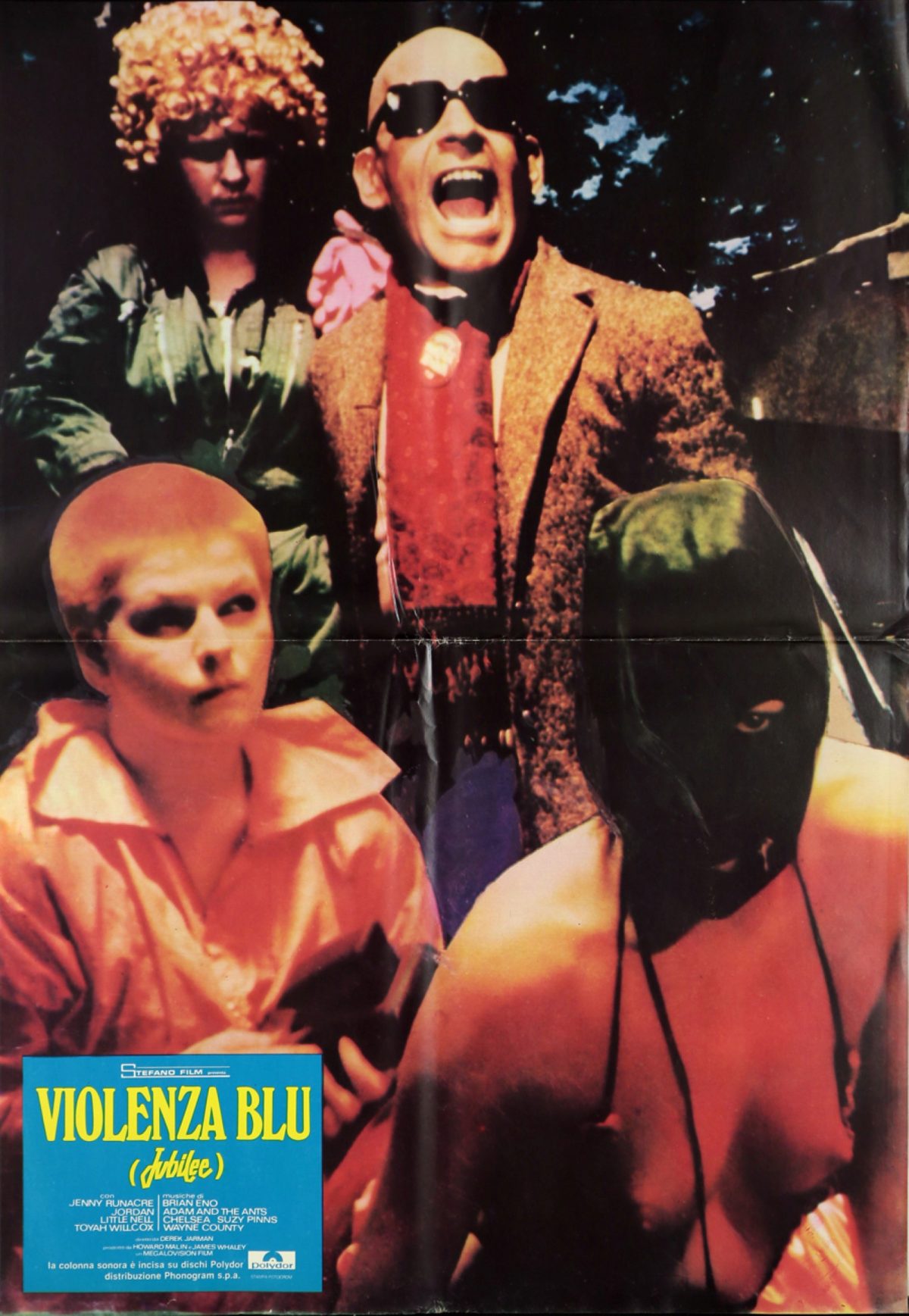
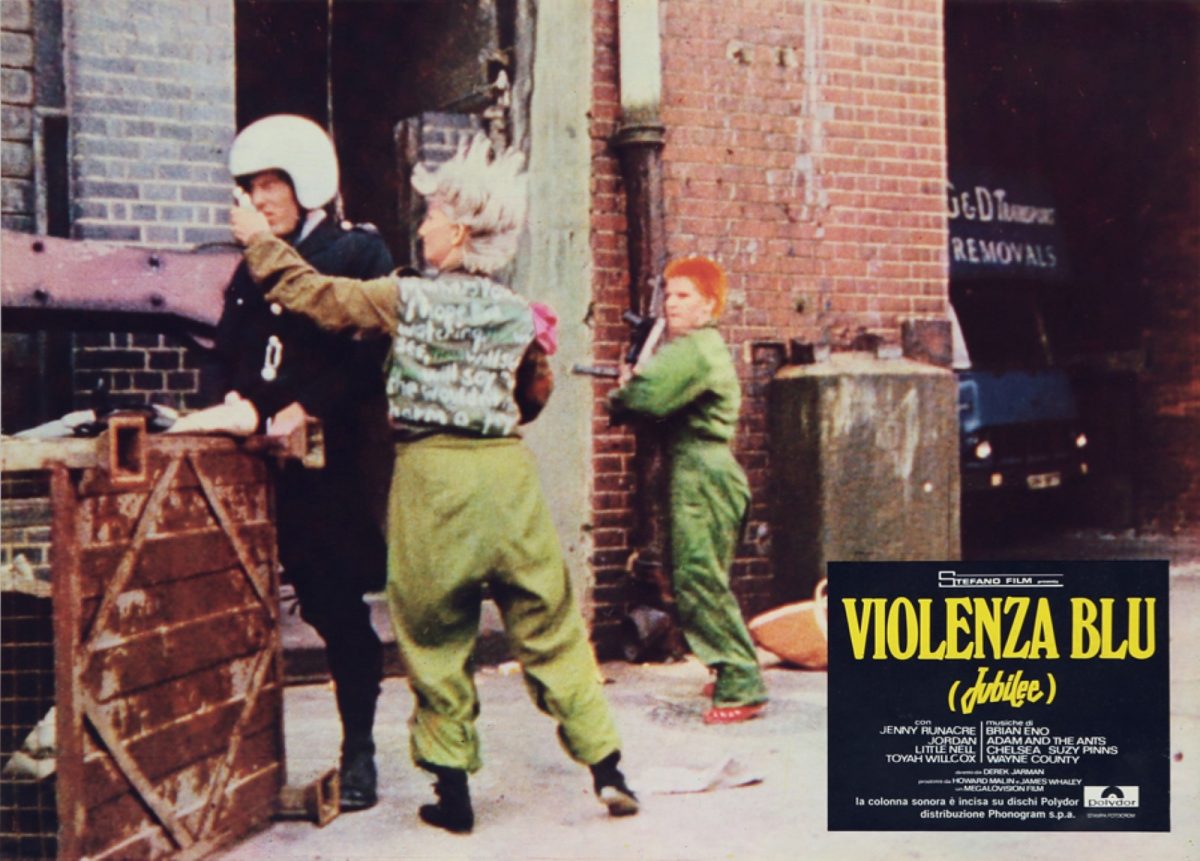
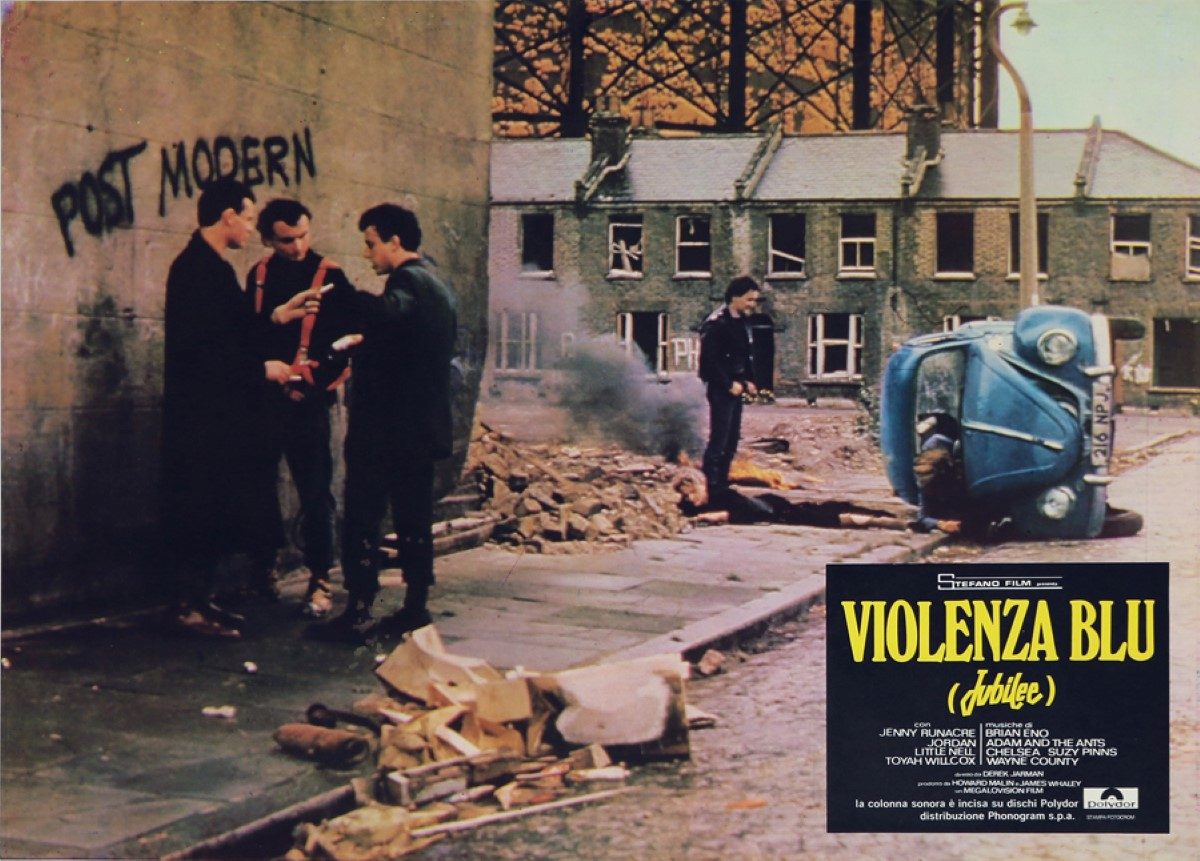
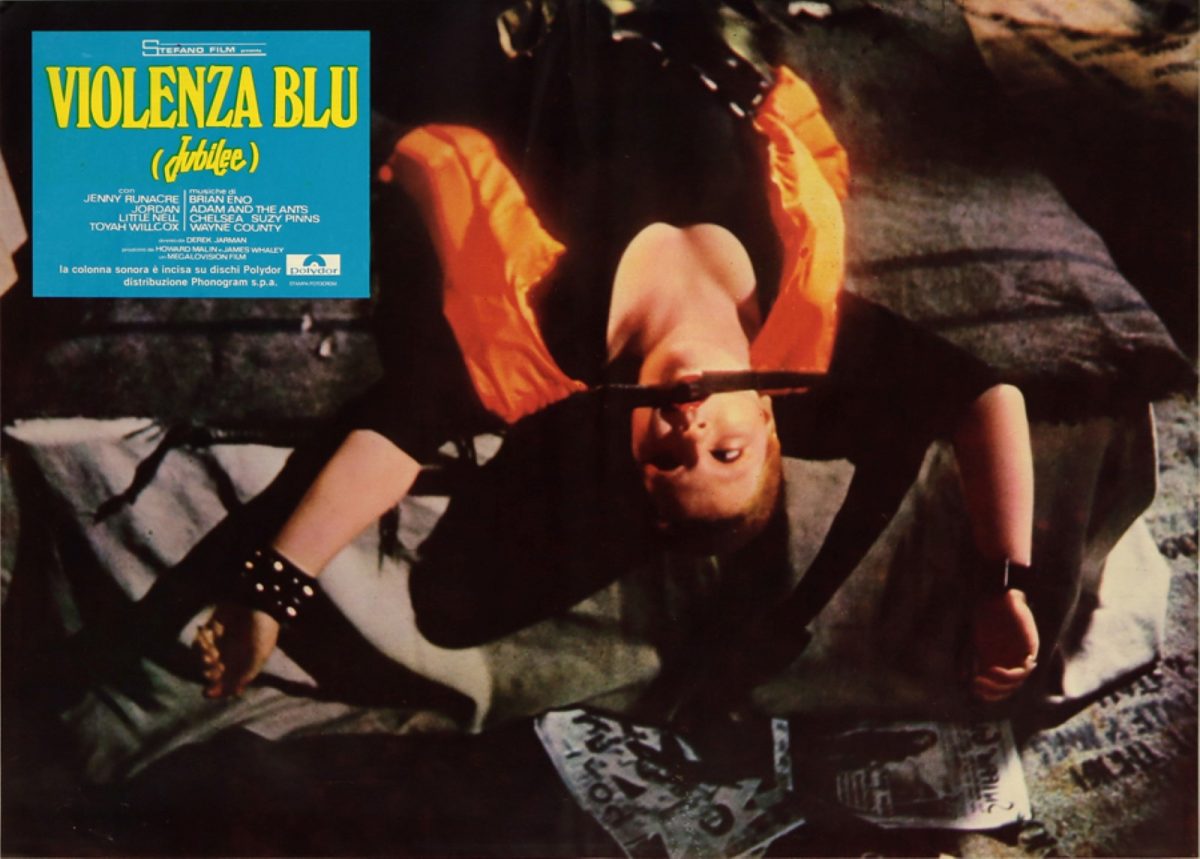
Would you like to support Flashbak?
Please consider making a donation to our site. We don't want to rely on ads to bring you the best of visual culture. You can also support us by signing up to our Mailing List. And you can also follow us on Facebook, Instagram and Twitter. For great art and culture delivered to your door, visit our shop.
